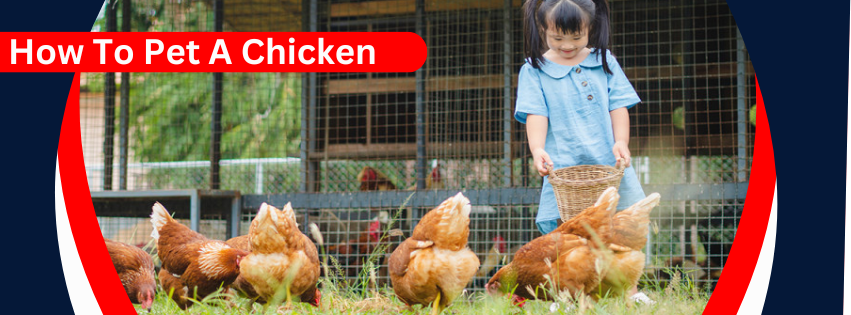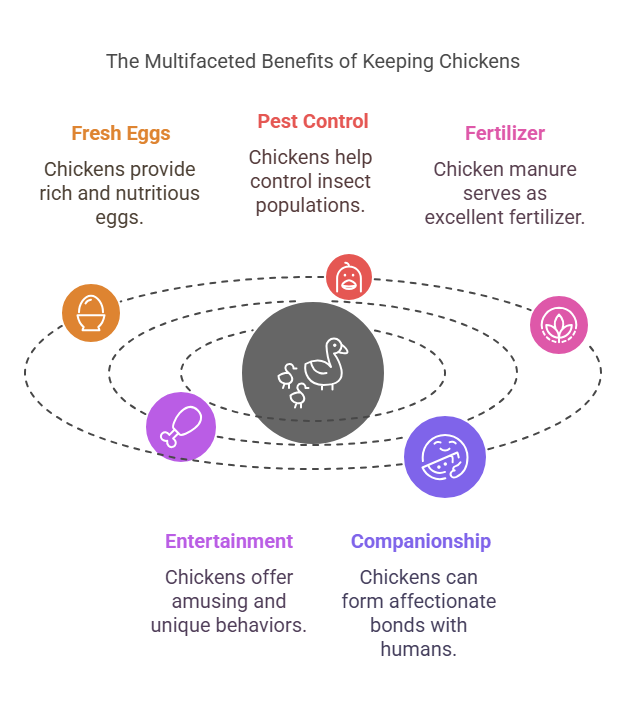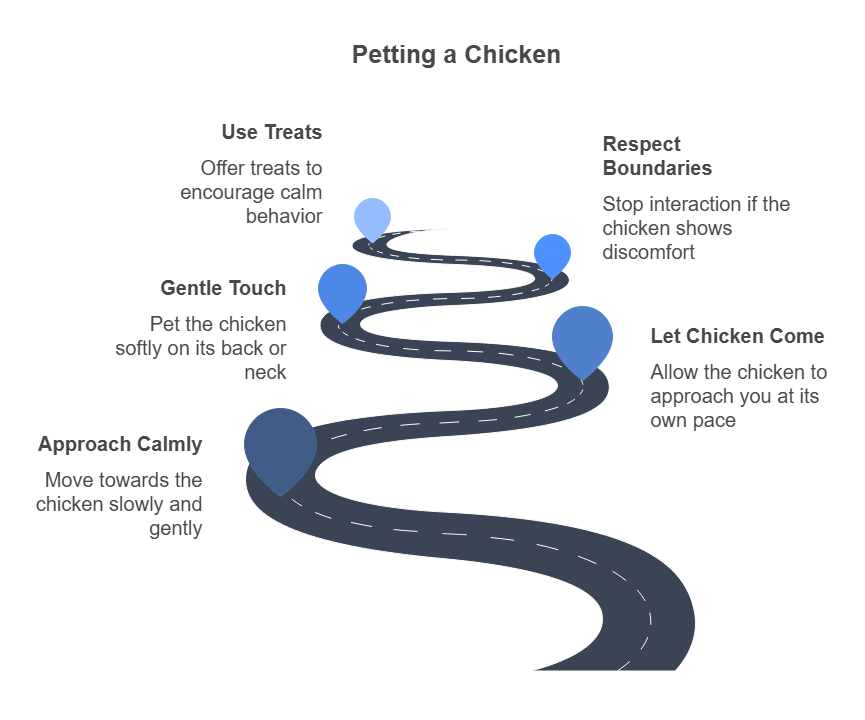Chickens are increasingly becoming popular pets in many households. They are friendly, low-maintenance, and offer a variety of benefits. Petting a chicken can be an enjoyable experience, but it’s essential to know the best practices to ensure both you and your chicken feel comfortable and safe. This guide will walk you through everything you need to know, from selecting the right chicken to understanding how to pet one.
Is Chicken a Right Fit for You?
Before adopting chickens as pets, it’s crucial to ask yourself a few questions. Are you ready to care for them? Chickens are not just for laying eggs. They need attention, space, and a safe environment. Keep in mind that chickens live for several years, often 5 to 10 years, depending on the breed.
“Chickens are wonderful and interesting creatures that are frequently underestimated for their personality and ability to show love.” – April Lee, Farmhouse Guide
Consider these factors:
- Do you have enough space? Chickens need a yard or space to roam.
- Are you prepared to care for them regularly? This includes feeding, cleaning, and keeping them safe from predators.
- Do you have the time to interact with them daily to help them feel comfortable?
If you answered “yes” to these questions, then chickens could be a great fit for you.
The Benefits of a Chicken
Chickens provide several advantages beyond companionship. Here are the main benefits of having chickens as pets:
- Fresh Eggs: One of the most obvious benefits is fresh eggs. Having your own chickens means access to eggs that are richer in taste and nutritional value than store-bought ones.
- Pest Control: Chickens love to forage for insects, which makes them great for natural pest control in your garden or yard.
- Fertilizer: Chicken manure is an excellent fertilizer for plants. Just make sure to compost it properly before using it on your garden.
- Entertainment: Chickens can be surprisingly entertaining. They have unique personalities and behaviors that can keep you amused for hours.
- Companionship: Many chickens enjoy human interaction and can become quite affectionate, forming bonds with their owners.
According to the Food and Agriculture Organization (FAO), the global chicken population reached 26 billion in 2025. In the United States, per capita consumption of broiler meat was about 96.9 pounds in 2022
What Chicken Makes the Best Pet?
Not all chickens are equally friendly or suited for being pets. Some breeds are more docile and affectionate than others, making them ideal for families and first-time chicken owners.
Top chicken breeds for pets:
- Silkies: Known for their soft, fluffy feathers and friendly nature.
- Rhode Island Reds: These are hardy, reliable, and can be very social.
- Australorp: Friendly and calm, they often enjoy human interaction.
- Orpingtons: These large chickens are gentle and affectionate, making them great pets.
- Plymouth Rocks: Known for their playful personalities and ease of handling.
Each chicken breed has its personality. Do some research to find the best one for your home and lifestyle.
What You Need to Pet a Chicken
Petting a chicken requires some preparation and understanding of their needs. Here’s what you’ll need:
- A Calm and Safe Environment: Chickens are easily startled, so ensure you approach them in a quiet, stress-free environment.
- Patience: Chickens need time to trust humans. Be patient as they get accustomed to you.
- Gentle Hands: Always pet your chicken gently, avoiding sudden movements that could scare them.
- Treats: Use treats like mealworms to build trust and encourage them to come closer.
- Time: Don’t rush your interactions. Let the chicken approach you at its own pace.
What to Consider When Petting a Chicken
When it comes to petting chickens, understanding their body language is key. Chickens have specific preferences about how and when they want to be touched.
- Signs of Comfort: A relaxed chicken will stand still, gently pecking at the ground. It may even come up to you.
- Signs of Stress: Chickens that are feeling threatened will puff up their feathers, flap their wings, or try to escape. If this happens, stop trying to pet them and give them space.
- Petting Areas: Most chickens enjoy being gently petted on their back or neck. Avoid their head and belly, which are more sensitive.
Avoid Over Petting
Chickens can easily get overstimulated. Keep petting sessions brief (about 5 minutes), especially if you are just building trust. Over-handling can cause stress and even harm the chicken.
How to Pet a Chicken
Petting a chicken involves a few simple steps to ensure both you and the chicken feel comfortable:
- Approach Calmly: Always approach a chicken from the front to avoid startling it. Keep your movements slow and controlled.
- Let the Chicken Come to You: Allow the chicken to come to you at its own pace. Don’t force it to approach you.
- Gentle Touch: Once the chicken is near you, use your fingers to gently pet its back or neck. Avoid grabbing or holding it too tightly.
- Respect Boundaries: If the chicken shows signs of discomfort, stop petting and let it wander off. Always respect its space.
- Use Treats as Positive Reinforcement: Offer small treats like mealworms or scraps of vegetables to reward your chicken for calm behavior.
By following these steps, you can help your chicken feel at ease and enjoy a pleasant interaction.
How to Raise a Chicken as a Pet
Raising chickens as pets involves more than just petting. You need to provide for their basic needs and ensure they are safe, healthy, and happy.
- Housing: Provide a safe, clean, and spacious coop where your chickens can sleep and lay eggs.
- Diet: Feed your chickens a balanced diet that includes chicken feed, fresh vegetables, and occasional treats. Don’t forget to give them fresh water daily.
- Exercise: Chickens need space to roam and scratch. Ensure they have access to a secure outdoor area where they can forage.
- Health Care: Regularly check your chickens for signs of illness, such as lethargy or changes in behavior. Consider vaccinating them and providing any necessary medications.
- Socialization: Chickens are social animals. Keep at least two or more chickens to ensure they don’t feel lonely or stressed.
By taking good care of your chickens, you’ll be able to enjoy their company for years.
How Much Does a Pet Chicken Cost?
The cost of a pet chicken can vary based on the breed, age, and where you purchase them. On average, expect to pay:
- Chickens from Hatcheries: $3 to $20 per chicken, depending on the breed.
- Ready-to-Lay Hens: $20 to $40 for hens that are already laying eggs.
- Coops and Supplies: A basic chicken coop can cost anywhere from $100 to $500, depending on size and quality.
Other ongoing costs include food, bedding, and potential health care expenses. Overall, raising chickens as pets is relatively affordable.
Where to Buy Pet Chickens
You can buy pet chickens from a variety of sources, including:
- Local Hatcheries: These places breed and sell chickens. You can often visit in person to pick out your chickens.
- Farm Supply Stores: Many stores sell chickens during spring, including popular retailers like Tractor Supply Co.
- Online Hatcheries: Websites like Meyer Hatchery and Murray McMurray Hatchery offer a wide selection of chickens for sale.
Before purchasing, be sure to check local regulations. Some areas have restrictions on owning chickens, especially in urban environments.
Where Does My Pet Chicken Ship From?
If you order chickens online, they will typically be shipped from hatcheries that specialize in breeding and shipping chickens. Some well-known hatcheries, like Meyer Hatchery and Cackle Hatchery, ship nationwide. Chickens are shipped via USPS or other courier services, usually in boxes designed to keep them safe and comfortable during the journey.
Shipping times can vary, but you can generally expect to receive your chickens within a few days of ordering, depending on your location.
What to Do with a Dead Pet Chicken
Unfortunately, chickens do not live forever. If your chicken passes away, you’ll need to handle it respectfully and safely.
- Burial: A simple and respectful method is to bury the chicken in your yard. Ensure the hole is deep enough to prevent animals from digging it up.
- Contact a Vet: If your chicken passed due to illness, contact a veterinarian to discuss the cause of death. They may recommend additional steps to ensure your remaining chickens are safe.
- Dispose of the Body Safely: If you’re unable to bury your chicken, you can contact a local animal control facility to ask for guidance on proper disposal methods.
While it’s never easy to say goodbye to a beloved pet, it’s important to handle the situation with care and respect.
FAQs About Petting Chickens
1. How often should I pet my chicken?
Pet your chicken for short sessions a few times a week. Over-handling can cause stress.
2. Do chickens like to be held?
Chickens generally don’t enjoy being held tightly. Most prefer gentle petting, especially on their back or neck.
3. Can chickens bond with their owners?
Yes, chickens can bond with their owners, especially if they are raised with positive interactions.
4. How can I tell if my chicken is happy?
A happy chicken will forage calmly, lay eggs regularly, and have smooth feathers. If it seems calm around you, it’s likely happy.
5. Can chickens be kept as indoor pets?
Chickens are outdoor animals, but some people have successfully kept chickens in large indoor enclosures, provided they have enough space
Petting a chicken can be a rewarding experience if done correctly. By understanding chicken behavior, approaching them calmly, and respecting their boundaries, you’ll be able to create a positive bond with your pet chicken. Remember, patience is key. Not all chickens will enjoy being petted right away, but with time and consistency, you’ll build a trusting relationship.




